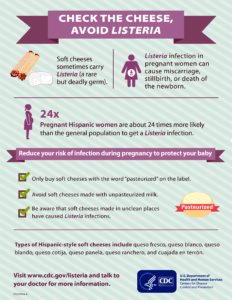 Pregnant Women are at Increased Risk of Food Poisoning
Pregnant Women are at Increased Risk of Food Poisoning
Know About Low-Risk Food Choices
With Kathryn Hoch, MD
Obstetrics and Gynecology
Dr. Kathryn Hoch, Boulder Medical Center OB-GYN physician, wants to help expectant mothers enjoy the holiday season while protecting themselves from listeria food poisoning. Pregnant women are 10 times more likely than the general population to get listeriosis, a rare but deadly foodborne infection caused by the bacteria Listeria (Center for Disease Control 2018).
“While everyone wants to keep food safe during the holidays, it is especially important for pregnant women since they are at an increased risk of food poisoning,” says Dr. Hoch. “There is no reason to be fearful to eat at a holiday party or event, but be aware of some good food choices during this phase for your baby and you.”

Click on the graphic above to enlarge the “Check The Cheese” flyer.
Food Safety While Pregnant
Listeria can be transferred from mother to baby, therefore Dr. Hoch advises expectant moms to make wise choices by selecting low risk food options. According to the experts at the Centers for Disease Control and Prevention, some tips include:
- Avoid raw or unpasteurized milk and products made with it, such as soft cheeses.These items can contain harmful germs, including Listeria. Avoid drinking raw milk and eating soft cheeses, such as queso fresco, Brie, Camembert, feta, goat cheese, or Roquefort, if they are made from raw or unpasteurized milk;
- Be aware that Hispanic-style cheeses made from pasteurized milk, such as queso fresco, also have caused Listeria infections, most likely because they were contaminated during cheese-making;
- Avoid other raw or unpasteurized products, such as juice or cider and uncooked fresh fruit and vegetables;
- Avoid Foods that contain raw/undercooked eggs, such as homemade Caesar salad dressing, raw cookie dough, and homemade eggnog;
- Avoid refrigerated deli meats. When it comes to the deli trays be cautious of raw meats, luncheon meats and deli-type salads;
- Be careful with seafood. Do not eat refrigerated smoked seafood unless it is in a cooked dish, such as a casserole, or unless it is canned or shelf-stable;
- Be aware of holiday beverages. To reduce the possibility of fetal alcohol syndrome, watch out for alcohol-containing holiday punch and eggnog. Avoid eggnog entirely unless you know it contains no alcohol and is pasteurized or made with pasteurized eggs and milk.
“If you are in doubt about how long food items have been sitting out, it’s best to just avoid them,” says Dr. Hoch.
This article was produced in partnership with The BirthPlace at Longmont United Hospital (LUH). For more information about the Boulder Medical Center OB-GYN and LUH partnership, please see below.
About Kathryn Hoch, MD
Dr. Kathryn Hoch has been an obstetrics and gynecology physician in North Denver and Boulder County since 2002. As part of the trusted Boulder Medical Center women’s health team, she enjoys caring for women in all of life’s stages, providing a full spectrum of women’s care. Her services include: annual exams; family planning; routine, high-risk pregnancies, and twins; VBACs planning; and much more.
For more:
- Dr. Hoch’s full profile
- Call (303) 938-4710 for an appointment
- Dr. Hoch is seeing patients at Boulder Medical Center clinics in Boulder and Longmont. Get directions
Boulder Medical Center + The BirthPlace at Longmont United Hospital

The Boulder Medical Center Women’s Health Team is proud to partner with The Birthplace at Longmont United Hospital for all your needs — before, during and after the birth.
The Boulder Medical Center OB-GYN team is proud to partner with The BirthPlace at Longmont United Hospital. The BirthPlace offers a family-friendly and comfortable environment for one of life’s most joyous occasions. All of your needs — before, during and after the birth, will be handled with the highest level of care. You can count on the Boulder Medical obstetrics team and The BirthPlace to be there every step of the way.


